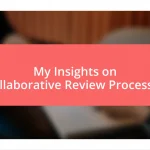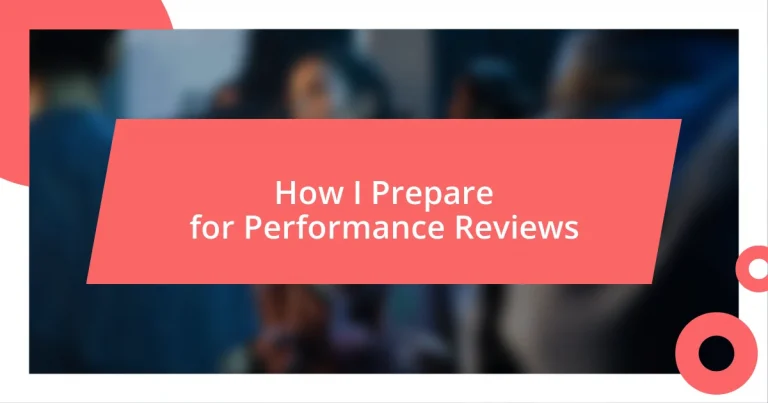Key takeaways:
- Performance reviews offer valuable insights for personal and professional growth, highlighting strengths and areas for development.
- Gathering diverse feedback and documenting achievements enhances preparation, allowing for a well-rounded self-assessment during reviews.
- Following up post-review fosters ongoing dialogue and collaboration, reinforcing commitment to growth and improvement.
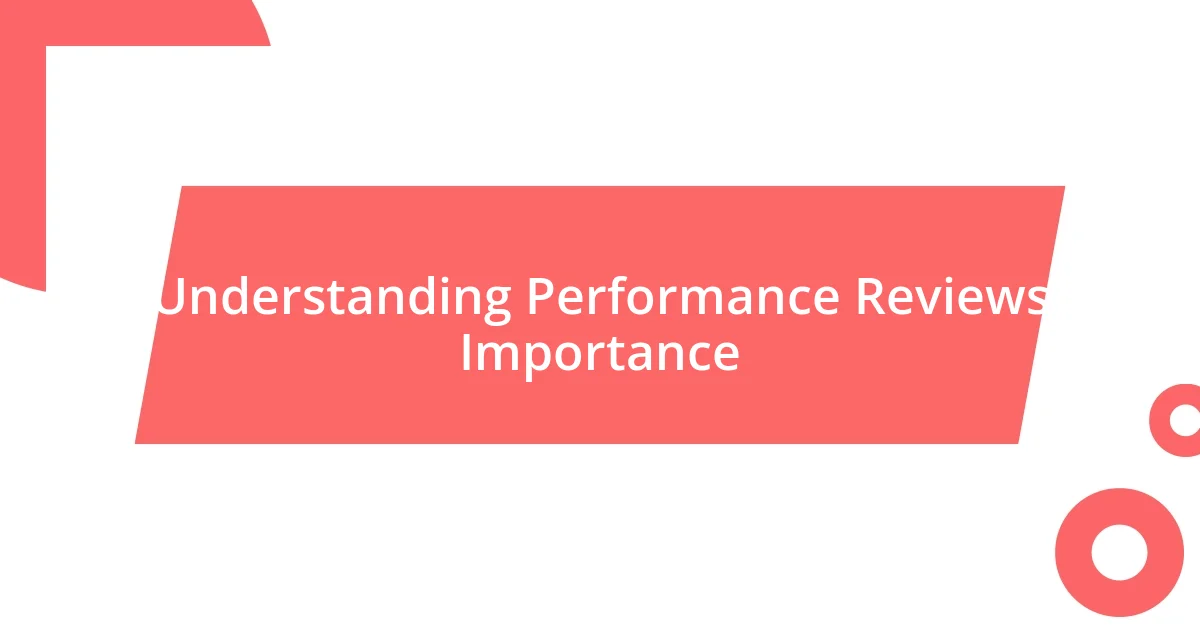
Understanding Performance Reviews Importance
Performance reviews are pivotal in shaping our professional journeys. I remember when I received my first review—it felt a bit nerve-wracking, but it opened my eyes to the areas where I excelled and where I could grow. It dawned on me that these evaluations are not just about criticism; they provide valuable insights that can guide our development.
Understanding the significance of these reviews can really change how we approach them. Have you ever thought about how much feedback can clarify your career aspirations? I once used a performance review to pivot into a role I was genuinely passionate about. That moment solidified for me that these discussions are about aligning personal goals with organizational expectations.
Moreover, performance reviews also foster open communication between employees and management. I recall a time when a candid conversation during my review led to a mentorship opportunity that I hadn’t even considered. It’s a reminder that sharing our thoughts can lead to support and growth we might not have realized was possible.
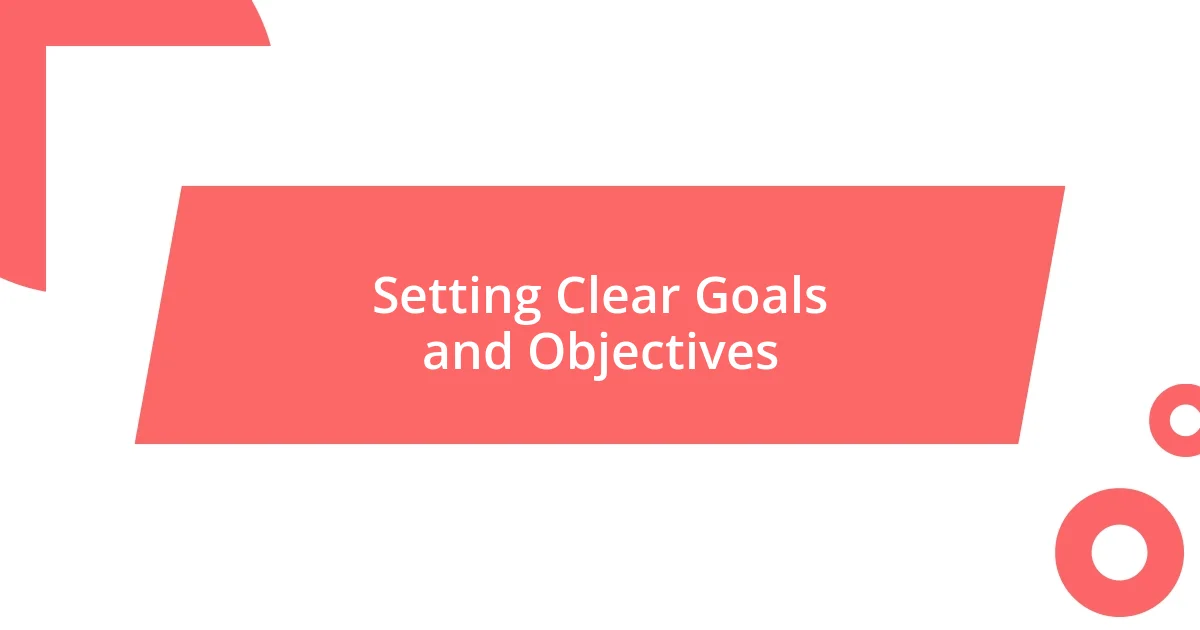
Setting Clear Goals and Objectives
Setting clear goals and objectives can transform how you prepare for your performance review. I’ve found that specific, measurable goals not only set my focus but also help track my progress throughout the year. The clarity that comes with well-defined objectives makes it much easier to advocate for myself during evaluations and articulate my achievements.
- Identify key areas of responsibility in your role.
- Break those responsibilities down into specific goals.
- Ensure your goals are measurable, so you can easily assess your progress.
- Set deadlines for achieving each objective to maintain accountability.
- Regularly review and adjust your goals based on feedback and changing circumstances.
It’s amazing how a simple checklist aligns your efforts with what management values. Last year, I Journals my goals and reviewed them monthly; this habit not only kept me accountable, but it also revealed patterns in my work that I hadn’t noticed before. When it finally came time for my review, I felt prepared—and that confidence reflected in my conversation with my supervisor.
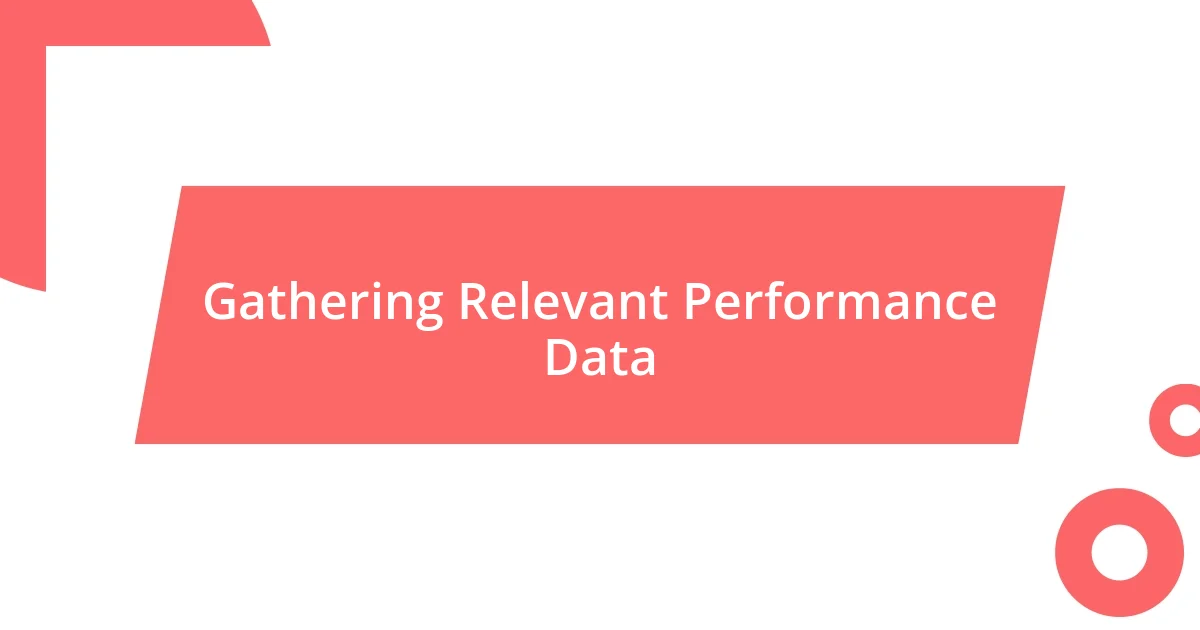
Gathering Relevant Performance Data
Successfully gathering relevant performance data is a crucial step that I always prioritize when preparing for my performance review. I take time to collect feedback from various sources, including peers, supervisors, and even clients. This multifaceted approach provides a well-rounded view of my contributions and the impact I’ve made. I remember a time when I gathered feedback from a colleague who pointed out my attention to detail on a significant project. Their insight helped me paint a clearer picture during my review and enhanced my narrative about my strengths.
Additionally, I keep track of specific achievements and projects throughout the year. Creating a dedicated document where I log milestones and successful outcomes allows me to present tangible evidence of my performance. I often reflect on how rewarding it is to look back and see my growth. Just last year, I identified a project that exceeded its targets by 30%. Highlighting this not only made me proud but also served as a definitive talking point during my review that illustrated my ability to exceed expectations.
Moreover, numerical data like key performance indicators (KPIs) greatly support my case. When I prepare for a review, I compare my results with team goals to showcase how my work aligns with broader objectives. For instance, when I increased client satisfaction scores by 15%, it wasn’t just a number; it represented hours of dedication and collaboration. This quantitative aspect solidified my contributions and underscored the value I brought to the team, making my discussions with management more impactful and persuasive.
| Data Source | Purpose |
|---|---|
| Peer Feedback | Provides diverse perspectives on performance |
| Personal Achievements | Highlights specific successes and contributions |
| Numerical Data (KPIs) | Quantifies impact and aligns with team goals |
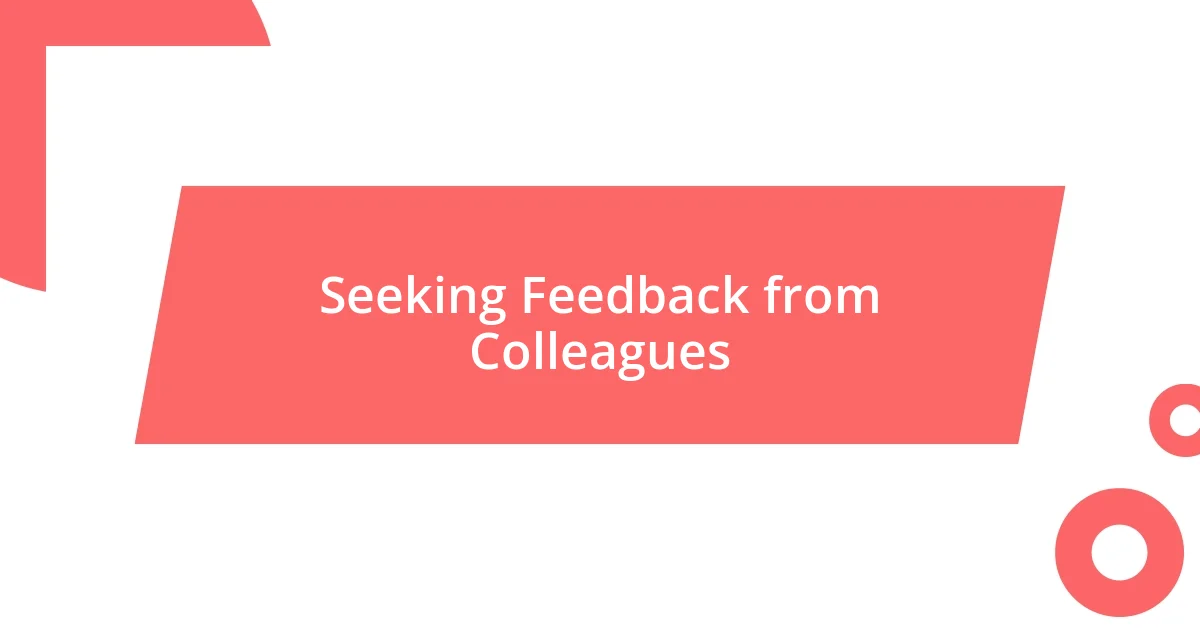
Seeking Feedback from Colleagues
Seeking feedback from colleagues is an integral part of my performance review preparation. I consciously invite my teammates for honest evaluations of my work. I remember requesting feedback after completing a difficult project, and a peer highlighted not just my contributions, but also how my leadership style positively affected the team dynamics. That moment taught me just how valuable their perspectives can be in painting a fuller picture of my performance.
Why should I limit my self-assessment to just my own perceptions? Engaging with colleagues offers fresh insights and often reveals strengths I hadn’t considered. For instance, during a recent review prep, one colleague mentioned my problem-solving skills during challenging project phases. This kind of feedback empowers me; it’s like finding hidden gems in my own work history. Each realization reinforces the notion that collaboration and communication are pivotal to personal and professional growth.
Having a conversation over coffee or a quick chat during breaks can yield thoughtful feedback that I might miss in a structured setting. I find it uplifting to hear how others view my contributions, as it cultivates a sense of camaraderie and fosters mutual respect. These interactions not only bolster my confidence but also leave me excited to share my collective insights during my review.
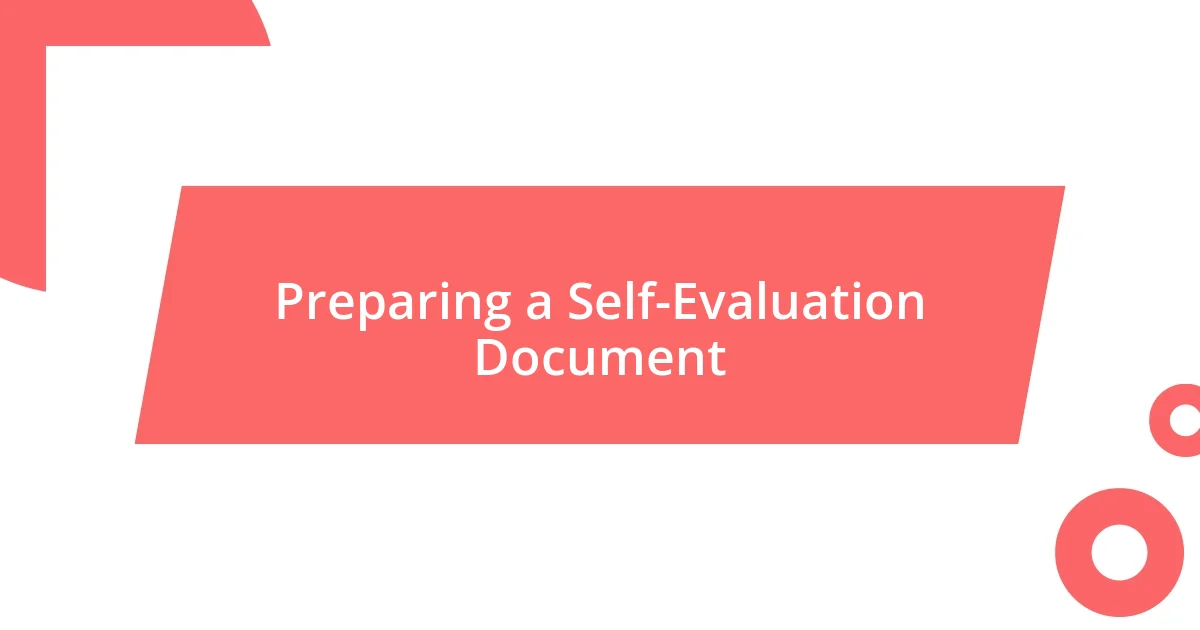
Preparing a Self-Evaluation Document
Preparing a self-evaluation document is an exercise in reflection and clarity for me. I’ve noticed that diving deep into my past achievements not only helps articulate my value but also reveals areas for growth. In one particular year, I took the time to write down every project I tackled, and when I reviewed it, I was amazed to see how far I’d come. It’s like looking through a photo album—each project a snapshot of my professional journey.
I also find that organizing my self-evaluation into themes, like leadership, teamwork, and innovation, makes it more engaging. For example, I dedicated a section to how I adapted during a crisis at work, which ultimately led to our team’s success. That experience felt like a turn of the tides, reminding me that challenges often hide valuable opportunities. Isn’t it fascinating how our struggles can shape who we are in our professional lives?
Lastly, I emphasize the importance of honesty in my self-evaluation. Sharing not just my wins but also the hiccups can be a powerful tool for growth. I remember one project where my oversight led to a significant delay. Addressing this in my document helped me articulate what I learned and how I planned to avoid similar pitfalls in the future. This vulnerability encourages dialogue during the review, making it less about self-promotion and more about collaborative progress. What’s the point of this exercise if we’re not aiming to learn and grow together?
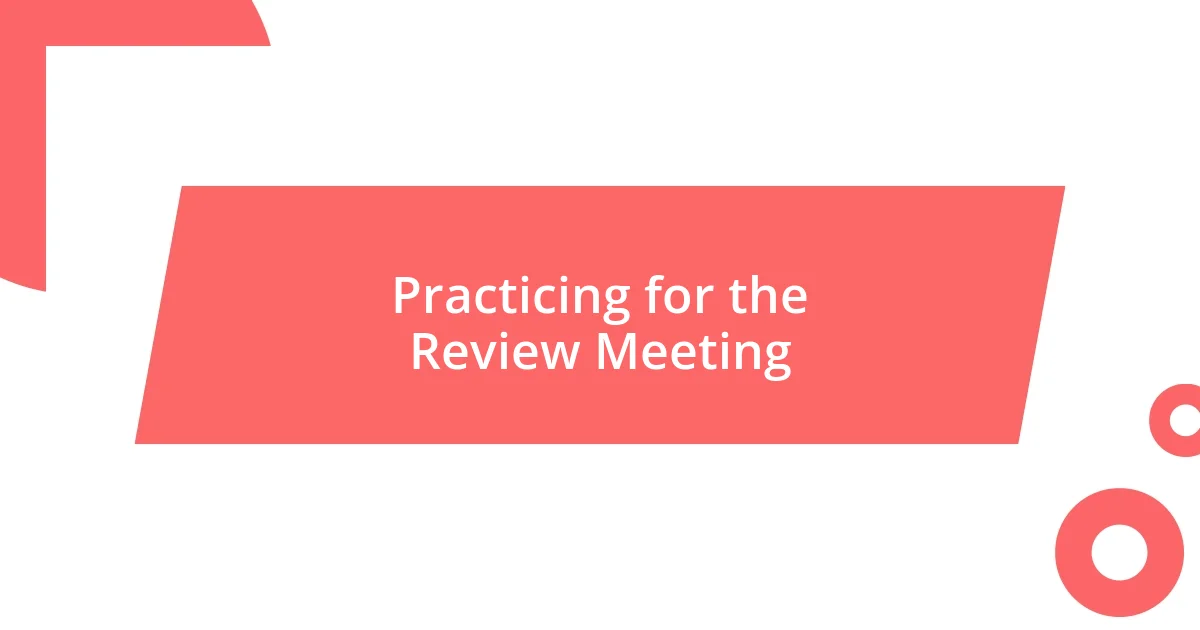
Practicing for the Review Meeting
Practicing for the review meeting is a crucial step that I don’t take lightly. Before the actual meeting, I make it a point to run through a mock review with a trusted colleague. I recall one instance where I invited a teammate to role-play the review with me. Not only did it help me articulate my thoughts more clearly, but it also built my confidence as I refined my delivery. Isn’t it amazing how rehearsing with someone else can unveil the nuances we might overlook when preparing alone?
I also find it beneficial to visualize the review scenarios. Imagining the questions my manager might ask helps me prepare thoughtful responses. During my last performance review, I anticipated questions about how I handled project deadlines and was ready to share specific examples. This proactive approach transformed my nervousness into a sense of control. Have you ever noticed how visualization can prime you for success? By picturing the conversation in my mind, I felt like I was already inside the meeting.
Another strategy I use is to record myself rehearsing the key points I want to address. Playing it back often reveals areas for improvement that I wouldn’t catch otherwise. I remember cringing at the awkward pauses during one of my recordings, prompting me to adjust my pacing for clarity. This small technique has not only polished my presentation but has also allowed me to infuse more authenticity into my responses. The more I practice, the more comfortable I feel- isn’t that what we all want when heading into a performance review?
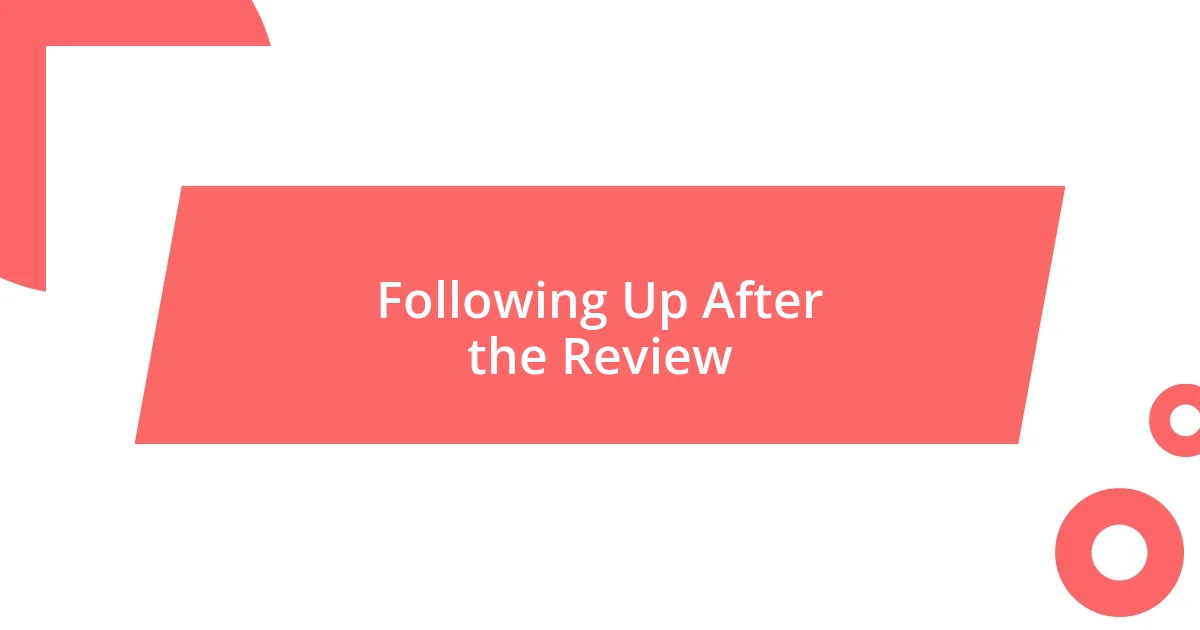
Following Up After the Review
Following up after the review is a critical aspect of the performance evaluation process. I’ve learned that sending a thank-you email to my manager shortly after the meeting can set a positive tone for ongoing dialogue. In one instance, I expressed my gratitude for their feedback on a challenging project. This simple gesture reminded me of the human side of these discussions—we’re all working together towards the same goals, after all.
Moreover, I always try to outline actionable steps based on our conversation. For example, if we discussed areas for improvement, I make it a point to document specific goals I want to work on. Sharing these goals with my manager demonstrates my commitment to growth. During a past review, I mentioned wanting to enhance my project management skills. By setting up a follow-up meeting to discuss resources and training, we turned a simple review into a constructive partnership.
Lastly, I find it essential to check in periodically to assess my progress. A few months after one review, I approached my manager and shared updates on the initiatives we discussed. Their positive feedback not only boosted my confidence but also opened the door for further conversations about future projects. It’s amazing how these follow-ups can foster a nurturing environment, igniting a sense of collaboration and shared achievement. Are we truly maximizing our potential if we don’t keep that conversation going?

